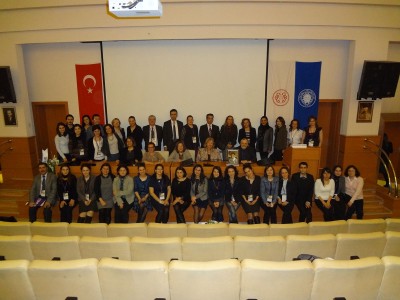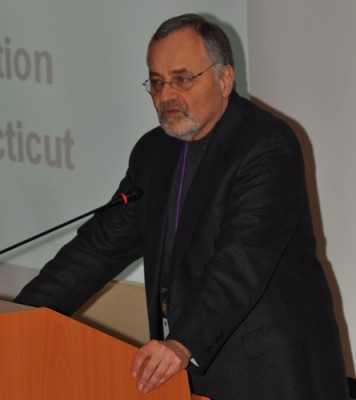Neag School of Education Professor Orv Karan, Ph.D., is using his more than 40 years of experience as a rehabilitation psychology and special education specialist to help medical, educational and social service providers in Turkey successfully transition youths with intellectual and developmental disabilities into the community.
So far, the Neag School Counseling Program coordinator has been to Turkey three times, the last trip in February at the request of Turkish leaders working to abolish the traditional practice of committing youths with low IQs and limited daily living skills to institutions. During his most recent visit, he gave two invited lectures: one on “Preparing students with disabilities for adulthood,” and the other on “Building skills for children and adolescents with intellectual disabilities.”
The lectures and case studies showed how it really does take a village to care for youths with disabilities, Karan said, but that the results can be life-changing for all involved.
“Young people who receive appropriate treatment and support from their families, professional caregivers and the community can experience amazing turnarounds and live rich, happy, productive lives as active members of their communities,” Karan said. “But it’s not one single fix that makes this kind of support available. It’s many fixes, in many areas, that create a totally new ecology and culture for how people with disabilities are viewed and cared for. Hospitals, schools, community leaders and parents are among the many aspects of society that all play a part.”
Although Karan has traveled throughout much of Turkey—roughly the same size as Texas—to meet as many people as possible, most of his interactions have taken place in or near the major cities of Istanbul and Ankara. To give all Turks access to Karan’s expertise, Turkish leaders have distributed subtitled videotapes, as well as translated copies of Karan’s lectures, to interested parents and caregivers across the country.
“So many things the United States does on behalf of children with disabilities and their families are still not even close to being a reality in other countries,” Karan explained. “Turkey is one of the most modern countries in the Middle East, yet for people with disabilities, there are few educational and healthcare services, and even fewer opportunities to become a part of their communities.”
Karan said it’s a professional passion to help people “in a real and lasting way” that led him to accept the Turkish government’s request to act as a consultant—and conduit—for disability care change. However, it was a personal interest that caused him to first get involved.
“About 13 years ago, I began working with a Turkish girl with extreme intellectual, emotional and behavioral disabilities,” Karan explained. “In Turkey, her family exhausted all available services seeking a solution, and it appeared an institution was the only option. But her parents had connections to Yale and could afford to bring her here, so they came to Connecticut for treatment, and that’s when I became involved. She now lives in her own home with support and enjoys a high quality of life. But it got me thinking. ‘What happens to the children of Turkish families who can’t afford to fly to the U.S. for treatment?’ ”
To find the answer, he decided to spend three weeks of his Spring 2011 sabbatical in Turkey.
“I visited programs serving children and youth with a wide variety of disabilities,” Karan said. “One of the things I stressed to the professionals and families I met was ‘As you may know, it wasn’t that awfully long ago that the U.S. believed institutionalization was the best way to care for adults and kids with developmental disabilities.’ But we’ve done much to change that in a relatively short time, and those in Turkey committed to making the same change can do it, too.”

Today, as a consultant, Karan talks with Turkish professionals via Skype roughly once a week. Conversations tackle everything from how Turkey can best enforce special education laws and dispel myths about disabilities, to how educators should integrate children with intellectual and emotional disabilities into public school classrooms.
“This work? It’s my passion,” Karan said simply. “Too often, people are held back because others don’t see their possibilities. But I look at people from a very different perspective. Often, my heart says ‘Try!’ when my brain says ‘It won’t work.’ Thankfully, I’ve proven my brain wrong on more than one occasion. I’m also thankful to UConn and so proud the school wants to share our expertise to make a difference in the lives of people thousands of miles away. That’s pretty incredible.”



